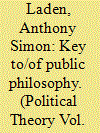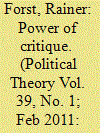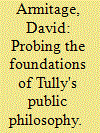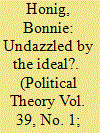|
|
|
Sort Order |
|
|
|
Items / Page
|
|
|
|
|
|
|
| Srl | Item |
| 1 |
ID:
101845


|
|
|
|
|
| Publication |
2011.
|
| Summary/Abstract |
What I would like to do in these brief remarks is offer a characterization of
what James Tully calls public philosophy, in part by situating it amongst other
more familiar positions in contemporary political philosophy, but also in part
by suggesting how once we grasp what is distinctive about this approach, it
can help us see that familiar terrain anew. To keep to Tully's musical metaphor, this will be an exercise in amplifying the bass line, the ostinato, in order
to make it easier for the rest of us to join Tully in his new key. With limited
space, what I say will be more suggestive and sketchy than I would like. It will
amount to humming a few bars in the hope that others can take up the tune. Or,
to use one of Tully's favorite images from Wittgenstein, to count 2, 4, 6, in the
hopes that you will know how to go on.
Let me start with a very crude map of three trends in contemporary political philosophy
|
|
|
|
|
|
|
|
|
|
|
|
|
|
|
|
| 2 |
ID:
101846


|
|
|
|
|
| Publication |
2011.
|
| Summary/Abstract |
I regard James Tully's work to be among the most important and innovative
in the contemporary field of what we could call critical political theory. This
not least for the reason that, apart from its many virtues, such as its unique
combination of historical and contemporary social analysis, Tully's approach
explicitly places the theoretical and practical task of social criticism at its
methodological and normative center.
1
I highlight "theoretical and practical"
here to indicate that I will raise some questions about the relation between the
two, and I also highlight "methodological and normative" to do the same
|
|
|
|
|
|
|
|
|
|
|
|
|
|
|
|
| 3 |
ID:
101847


|
|
|
|
|
| Publication |
2011.
|
| Summary/Abstract |
James Tully's Public Philosophy in a New Key is a complex intellectual edifice. Tully deftly deploys the philosophical tools forged by, among others,
Wittgenstein, Arendt, Foucault, and Skinner to dismantle the architecture of
modern political reason in order to build in its place a more robust structure
adequate to the needs of a "de-imperialising age."
1
The resources he uses are
unusually diverse, ranging across the whole canon of Western political
thought, via historical methodology and critical philosophy, to the works of
contemporary public activists. The result, to paraphrase one philosopher who
is definitely not part of his synthesis, is a building for dwelling, and a dwelling for thinking
|
|
|
|
|
|
|
|
|
|
|
|
|
|
|
|
| 4 |
ID:
101849


|
|
|
|
|
| Publication |
2011.
|
| Summary/Abstract |
"If we wish to do justice to the conflicts that surround us and lead to one tragedy
after another, we can do no better than to keep the example of Antigone
constantly in mind," says James Tully in Strange Multiplicity.
2
But it is not
Sophocles' lamenting title character that draws Tully, nor is it the playwright's
tragic message. It is Haemon, the "exemplary citizen of the intercultural common ground" (23), who sees the justice of Antigone's claim and pleads with his
father, Creon, for restraint.
3
Sophocles' play is unmentioned in the two volumes
of Public Philosophy in a New Key but, like Haemon, Tully here positions
himself between the worlds of dissidence and governance, speaking to the
powerful in soft reasonable tones on behalf of subaltern subjects, and arguing
that we can break out of seemingly tragic impasses if we take instruction from
the "rough ground" of politics and the pacific ways of nature
|
|
|
|
|
|
|
|
|
|
|
|
|
|
|
|
|
|
|
|
|